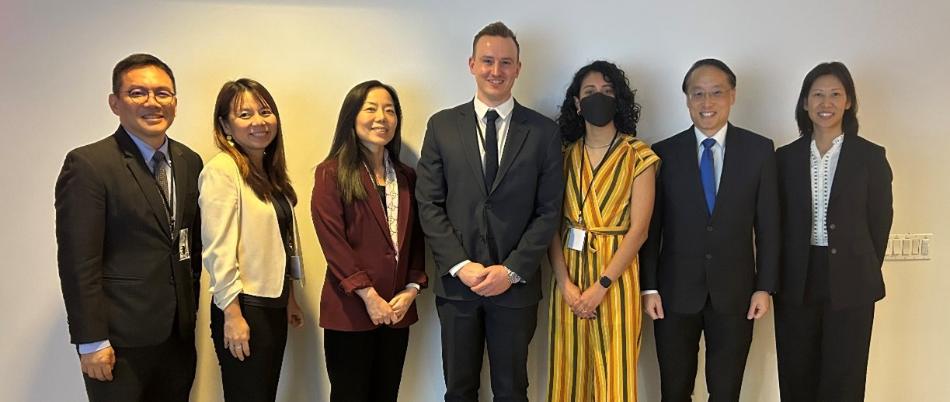
A future awaits where the world's energy systems are not only seamlessly interconnected but also driven by the forefront of clean technology. This forward-looking vision is rapidly transitioning from conceptual to concrete, fuelled by the spirit of innovation and collective commitment to a net zero future.
In a pivotal step along this transformative journey, SIEWConnects@New York brought together a lineup of diverse energy experts. Their discussions, themed "Energy Innovation and Collaboration”, provided strategic insights into propelling energy transformation efforts across ASEAN and beyond.
Leading the discussions were Mr Ngiam Shih Chun, Chief Executive, Energy Market Authority (EMA) of Singapore; Ms Kyung-Ah Park, Head of ESG Investment Management, and Managing Director of Sustainability, Temasek; Ms Mei Shibata, Partner, Oliver Wyman; Ms Stephanie Diaz, Specialist of Technology and Innovation, BloombergNEF; and moderator Mr Reed Blakemore, Director, Research and Programs, Global Energy Center, Atlantic Council.
Here are five critical insights distilled from the discussions:
- Energy transition investment needs to triple, and fast
In 2023, energy transition investments reached a record US$1.8 trillion globally, yet fell short of the net zero trajectory. Ms Diaz highlighted during her presentation that annual investments would have to triple—at a projected US$4.8 trillion—for the rest of this decade.
Ms Diaz emphasised the urgency of speeding up the deployment of technologies like wind, solar, and batteries, and highlighted the funding gap for scaling next-gen low carbon solutions. Despite significant investment in innovation across all sectors, Ms Dia pointed out imbalances within the entire ecosystem. She further emphasised the absence of proper market signals to help encourage continued expansion in this area.
- Clean energy has to scale for impact
The imperative to mainstream renewable energy and low carbon technologies was a focal point. Mr Blakemore emphasised the urgent need to intensify efforts and expand the scope and pace to achieve net zero targets. Ms Park talked about using blended finance to initiate and attract more commercial capital needed for the energy transition.
Ms Shibata shared a crucial insight to use visible success stories as catalysts to inspire adoption. She explained that a significant success story can often encourage initial uptake, making subsequent efforts much easier to replicate elsewhere.
- Radical collaboration and a systems approach help bridge gaps
The panel advocated for radical collaboration across all sectors, as well as a holistic systems approach to effectively address the complex challenges of the energy transition.
Mr Ngiam showcased Singapore's holistic strategy through a network of partnerships spanning governments, industries, and innovators, with the aim to build a demonstrable and scalable ecosystem. He shared that Singapore's plan focuses on targeting three outcomes, supported by financing, regulations, and government policies.
- Digitalisation is pivotal in the energy transformation
Digitalisation's importance in optimising energy asset management and enhancing grid resilience was also highlighted. Ms Diaz pointed out that digitalisation will play a crucial role in prolonging the lifetime of ageing assets and optimising their use. She said this potentially reduces the need to build as many new and costly grid lines.
Ms Shibata noted digitalisation's role in translating complex fieldwork into actionable data, as well as enhancing grid resilience against physical and cyber threats. She emphasised the necessity of recognising that digitalisation should be tailored to fit specific needs and situations.
- Building adaptive energy systems is crucial for a diversifying energy mix
The panellists agreed on the importance of creating energy systems flexible enough to accommodate a diversifying mix of sources and remain robust against fluctuations in supply and demand. Mr Blakemore observed that the future energy landscape is not just renewable but also resilient and adaptable to the ever-changing needs of energy production and consumption.
This involves evaluating the role of coal and gas within the energy transition. Ms Park highlighted that addressing energy security and affordability, as well as meeting Southeast Asia's growing energy demand in a resilient way necessitates the continued use of coal and gas in for the foreseeable future. She also pointed out the importance of improving coal and gas efficiency and reducing its carbon emissions. To achieve this, Ms Park highlighted the need for a comprehensive approach, including utilising technologies such as carbon capture, fostering collaboration across stakeholders, and creating an environment that attracts investment.
Looking to SIEW 2024
The SIEWConnects@New York marks the start of crucial dialogues shaping our energy future. Be part of this transformative journey at SIEW 2024, happening from 21-25 October. Register your interest to attend!